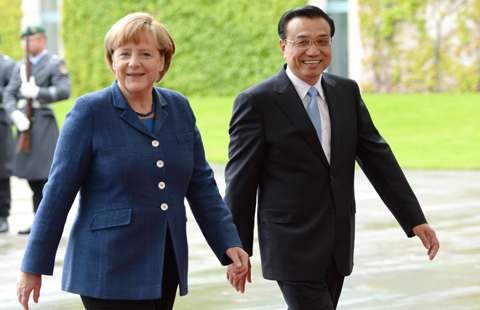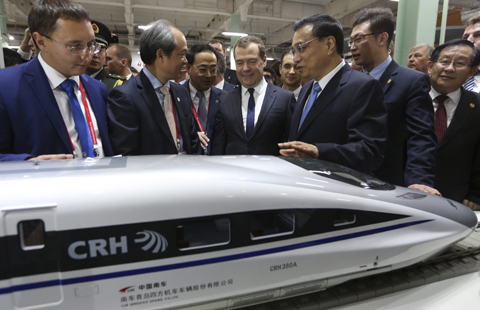
Full text: Achieving common and inclusive development through innovation
Comments Print Mail Large Medium SmallSpeech by H.E. Li Keqiang
Premier of the State Council of the People's Republic of China
At the Third Moscow International Forum for Innovative Development
Moscow, 14 October 2014
Your Excellency Prime Minister Dimitry Medvedev,
Distinguished Guests,
Ladies and Gentlemen,
Dear Friends,
Dobriy den' (Good morning)! It is a great pleasure to attend the Third Moscow International Forum for Innovative Development "Open Innovations". I would like to extend, on behalf of the Chinese government, congratulations on the opening of the forum.
Innovation is the perpetual engine driving development and progress of humanity. The world, which is undergoing major transformation and adjustment, calls for innovations of greater depth at a wider scope. Being fettered by old conventions or relying on one's own efforts will not lead to such innovations. What we need is openness, cooperation and sharing. When the international financial crisis broke out six years ago, the international community acted by pulling together to prevent the crisis from worsening and spreading. With further progress in economic globalization and IT application, it is even more important for countries to join hands in pursuing cooperative innovation in order to realize a multiplication of knowledge and value, overcome development challenges and achieve common prosperity. This is what open innovation is all about.
Open innovation includes not only innovation and cooperation in technology, but also innovation and sharing on systems and institutions. At the moment, new technologies are promoting profound adjustments in the global economic and industrial patterns while the world economic recovery remains a bumpy road. Only when technological innovation and structural reform are combined to form a synergy, and only when the creativity and innovation potential of the people are fully unleashed, can we produce a strong momentum to sustain global economic stability and recovery. During this process, countries need to share experience of reform and innovation, narrow the "innovation gap", and pursue inclusive development and development for all.
Ladies and Gentlemen,
In China, people are becoming more and more enthusiastic about innovation. At the Summer Davos held in Tianjin not long ago, there were heated discussions on the theme of creating value through innovation. My foreign friends often ask me, what is the secret behind China's sustained growth? The answer is the hard work and wisdom of the Chinese people. The reform and opening up of China, involving the more than 1.3 billion people, is an innovation campaign of the largest scale ever in the world. Through such reform measures as empowering the farmers with the land operation rights, reforming the SOEs and developing the private sector, we have fully stimulated the creativity of the multiple players in our economy. Many of our practices and systems, which have proven to be effective, were all established in this process. With the unleashed creativity of tens of millions of the people, the society has gained a stronger capacity to create wealth and the people have become better off. Opening up is also a kind of reform. We have opened up to the world, promoted reform through opening up, and enhanced our innovation capacity and competitiveness through opening up in wider scope and at higher level.
Science and technology have served as the primary productive force in driving China's development. A robust scientific and technological sector would not be possible without reform. Over the past 30 years and more, we have deepened reform of science and technology institutions. While strengthening basic research, we have encouraged the scientific and technological personnel to compete in the market and create their own value. In this way, we have developed and grown scientific and technological companies through market competition, and boosted the vigor of the market and innovation.
China has made remarkable achievements in development. However, we know clearly that China is still the largest developing country. It still ranks around the 80th in the world in terms of per capita GDP, and lags far behind developed countries in science and technology. The quality and efficiency of the economy is in the process of improving, and there remain quite some systemic and institutional obstacles that stand in the way of development. China needs to achieve faster and better growth to become a moderately developed country by the middle of this century. What is crucial is to further free our mind, persist in reform and innovation, and unleash the creativity of the people so that the whole society will be full of vigor and vitality, providing a reservoir of energy that propels development.
Related Stories
Premier Li Keqiang promotes innovation in Moscow speech 2014-10-15 09:15
Open innovation important in promoting common development, prosperity: Chinese premier 2014-10-14 19:47
Forum on innovation technologies to be held 2014-10-13 14:41
First Announcement of the International Forum on Intellectual Property & Self-Innovation 2006 Shanghai 2014-10-13 10:04
Review of International Forum on Intellectual Property & Self-Innovation 2005 Shanghai 2014-10-13 10:04
Background






